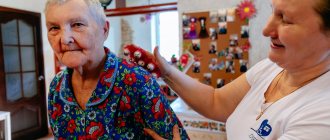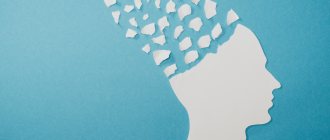Our expert is an associate professor, senior researcher at the laboratory of general geriatrics and neurogeriatrics of the Russian Gerontological Research and Clinical Center of the Federal State Budgetary Educational Institution of Higher Education Russian National Research Medical University named after. N.I. Pirogova Ministry of Health of Russia Elen Mkhitaryan .
“Senile insanity”, “age-related dementia”, “sclerosis” - everything that was previously called these words is now called “dementia”. But this is not a diagnosis yet, but only a symptom of many age-related diseases.
Article on the topic Alexander Myasnikov: “Hypertension is the cause of heart attacks and dementia”
Not old age, but illness
According to statistics, approximately 80% of people over 60 years of age have some form of cognitive impairment. The older the person, the higher the risk. The statistics are confirmed by numerous studies, in particular those conducted by employees of the Russian Gerontological Research and Clinical Center among elderly visitors to city clinics. 8% of them had severe impairments (dementia), and 46% had moderate cognitive impairment. Because the problem is so widespread, many people consider it normal. Like, old age is not a joy, of course. And that’s why they don’t turn to doctors until, alas, they lose the opportunity not only to work, but even to care for themselves. However, neurologists are confident: old age and dementia are not synonymous, and it is possible to live to an old age with sound mind and strong memory. But at the first alarming symptoms, you should immediately contact a neurologist or geriatrician and begin treatment. This will preserve a person’s independence for 10 years, whereas without treatment he will become severely disabled in 3 years.
Click to enlarge
Consequences of senile dementia
The development of dementia in old age leads to the following:
- Loss of self-care skills.
- Threat of emergency situations (fire, gas leak, flooding, etc.).
- Risk of injury to the patient.
- The likelihood of bedsores forming, as well as their infection (if the patient is immobilized).
- Exhaustion and dehydration of the body.
- Aggressive behavior towards other people, self-aggression.
- Mental disorders, manifested in the form of delusions, hallucinosis, etc.
We recommend
“Caring for older people with dementia: learning to build relationships” Read more
The many faces of dementia
The most common cause of weakening memory and intelligence in the elderly is Alzheimer's disease. In addition to Alzheimer's disease, dementia can also be caused by: vascular brain damage, dementia with Lewy bodies, frontotemporal degeneration and dementia associated with other diseases (Parkinson's disease, brain tumors, multiple sclerosis, stroke, intoxication, infections, alcoholism, head injuries etc.). There is also reversible dementia associated with a deficiency of certain vitamins. And each of them is treated differently, so it is very important to establish the correct diagnosis.
Article on the topic
Is dementia a death sentence? Who is at risk and can the disease be avoided? The course of different types of dementia is also different. For example, with Alzheimer's disease, orientation disturbances, problems with counting and speech (difficulties in finding words) occur; a person remembers well what happened to him many years ago, and does not remember what he did yesterday. Dementia with Lewy bodies is often accompanied by visual illusions and hallucinations, sleep disturbances, confusion, loss of spatial orientation, as well as autonomic symptoms (fainting, low blood pressure, urinary and bowel motility disorders). Frontotemporal dementia, which accounts for only 5% of all other similar disorders and is associated with a family history in 30–40% of cases, usually occurs at an earlier age (from 50 to 60 years) and is manifested by thinking, behavioral and speech problems that progress over time violations. A sick person's character and behavior can change dramatically: a kind grandmother becomes quarrelsome and aggressive, and a previously quiet grandfather begins to blatantly pester a young neighbor. Vascular dementia, associated with atherosclerosis and accounting for only 10% of all cases, manifests itself in the form of mental slowdown and decreased mental activity, a strong narrowing of the range of interests, increasing selfishness and increasing talkativeness. Writing is often impaired and the gait becomes shuffling.
Click to enlarge
Alcoholic dementia
This type appears due to the long-term (over 15–20 years) influence of toxic substances on the brain. In addition to the direct effects of alcohol, the development of pathology is indirectly affected by vascular disorders and endotoxins in alcoholic liver damage.
In most patients at the third stage of alcoholism, when the personality has degraded, atrophic changes in the brain are noticeable, in the form of dilated cerebral ventricles and furrows in the cerebral cortex.
Clinical symptoms of alcoholic dementia are expressed in a diffuse decrease in intelligence. Due to personality degradation, the patient’s memory, attention, and ability to think abstractly deteriorate. Emotional hardening occurs, social ties are destroyed, thinking becomes primitive, and all value guidelines disappear.
At this advanced stage of alcoholism, it is difficult to motivate a person to engage in treatment. But if the patient completely abstains from alcohol for 6–12 months, then the symptoms gradually decrease. In addition, according to research, organic defects are smoothed out.
Don't lose your head!
Treating dementia on the advice of a neighbor, a pharmacist at a pharmacy, or a doctor on TV is very dangerous. By using the wrong thing, you can waste valuable time. For example, in Alzheimer's disease, vascular nootropic drugs do not help at all. For vascular dementia, nootropics are used, but not just any one, but only with a certain mechanism of action and in different dosages, so their choice is strictly up to the neurologist. In addition, different types of dementia require the inclusion of different additional medications: for vascular dementia, drugs for correcting the cardiovascular system (statins, antiplatelet agents, anticoagulants) are needed, for frontotemporal dementia - antidepressants. And, for example, with dementia with Lewy bodies, patients have increased sensitivity to antipsychotics. Such a patient comes to a psychiatrist with hallucinations, he is prescribed haloperidol, and due to increased sensitivity to this medicine, even a couple of drops can greatly worsen cognitive abilities.
And even taking those medications that are used in the treatment of all types of dementia (there are 4 of these drugs in total) cannot be done at your own discretion. Their choice, dosage and sequence of administration depend on the type of disorder. Therefore, the first step is to make an accurate diagnosis. To do this, it is first necessary to conduct neuropsychological testing. So far, only neurologists and geriatricians can carry it out, but soon all first-line doctors will have to master this skill. Based on neuropsychological testing, the doctor will prescribe further examination (ultrasound of neck vessels, MRI of the brain, etc.). You should not rush to conduct an expensive study yourself - after all, only a doctor can recommend what exactly needs to be studied and on what device.
Article on the topic
TV and monotonous work. What and how leads a person to dementia
Types of dementia in old age
According to the etiological factor, dementia can be:
- vascular,
- atrophic,
- mixed.
Depending on where the lesion is located, the following types of dementia in the elderly are distinguished:
- cortical (in the cortical centers of the brain);
- subcortical (basal ganglia, white matter, limbic system, etc.);
- cortical-subcortical;
- multifocal, accompanied by many foci of brain tissue damage.
Syndromic classification divides dementia into:
- total (changes are rough, pronounced);
- lacunar, or dysmnestic (occurs with milder symptoms).
Pseudodementia is distinguished separately. In this condition, cognitive functions sharply deteriorate due to existing psychiatric pathology (hysteroid psychopathy, depressive disorders).
Exercises to train your brain
- Forming words in your mind in reverse (cat - current, needle - algi). You need to start with short words of 3 letters, then the number of letters increases.
- Making new words from one by changing letters. For example, from the word “bottle”: bull, rear, bun, smile...
- Finish the saying. The point is to complete the second part of a famous proverb, riddle or saying. For example, “To be afraid of wolves - ...”, “Forty clothes - ...”, “Without difficulty - ...”.
- Drawing geometric shapes in mirror reflection. You need to start with simple triangles and rhombuses, then the shapes can be more complicated.
- The fourth one is extra. You need to find the odd one out among the four words and explain why. For example, owl, wolf, crow, black grouse. (A wolf is not a bird, it is superfluous.)
- Children's games. For example, you can play an analogue of the game: “I know 5 boys’ names.” This way you can remember the names of vegetables, kitchen utensils, etc. There may not be 5, but 7 or more.
Modern methods of treating dementia
In the 21st century, new developments in the field of recognition and treatment of dementia in old age are constantly emerging. For example, modern diagnostic methods include cerebrospinal fluid analysis, MRI and positron emission tomography.
Some laboratories are working on a vaccine for dementia. Scientists “train” the immune system to identify pathogenic proteins and eliminate them.
Another promising area is gene therapy. It will help prevent the deposition of affected proteins in the brain.
We recommend
“Anti-dementia drugs for the elderly depending on the stage of the disease” Read more
How to care for someone with dementia
Elderly patients with dementia require constant care. Patients themselves, as well as those caring for them, experience great emotional and physical stress. An elderly patient is unpredictable; at any moment he can commit an inappropriate act and endanger not only himself, but also those around him. Therefore, such persons often suffer from discrimination against them. This happens especially often in nursing homes, where elderly patients are cared for by strangers who do not fully understand the essence of the disease. There are known cases of rude treatment of elderly patients and their relatives by medical personnel. If society becomes more aware of what dementia is, the situation could improve significantly.
Dementia in old age is not a death sentence. All that is required from relatives is an understanding that their loved one needs care and help in everyday life. Family members can make the environment safe by being considerate. Patience is important in providing complete care.
Regular examination of an elderly patient by a doctor and monitoring of medication intake is necessary. Medicines should not be in the public domain.
Unfortunately, the prognosis for elderly patients is quite disappointing. The process of mental degradation is irreversible, it cannot be stopped, but it is quite possible to slow it down so that the patient can lead a full life in society longer.
Life expectancy with this disease can vary from several months to decades. Timely therapy and regular training aimed at improving memory and attention are especially important. It would be reasonable to place the elderly patient in a special geriatric center for ongoing medical monitoring.
The following are used as preventive measures:
- control of blood pressure, cholesterol and sugar levels (after 60 years);
- rejection of bad habits;
- constant physical activity;
- regular mental training;
- proper nutrition.
To avoid dementia in old age, it is necessary to constantly train the brain, develop memory and attention. To do this, you should read books and retell them to others, count and add up prices in the store in your mind, and solve crosswords. Sometimes preventing a disease is much easier than dealing with its consequences.
We recommend
“Boarding house for elderly people with dementia: how to make the right choice” Read more
Physical activity
A sedentary lifestyle leads to thinning of brain structures and deterioration of cerebral circulation. Physical activity prevents the development of hypertension, obesity, and reduces the risk of stroke. Dancing, which requires high-quality coordination, helps prevent memory deterioration.
For those who have retired, four types of exercise can be recommended: aerobic, strength, balance and flexibility.
Aerobic exercise should be performed for 30-60 minutes four times a week. The intensity of the workout should be 60-65% of the maximum heart rate. This level allows the body to produce hormones and other bioactive substances that trigger beneficial changes in the brain matter. If walking is chosen as an aerobic exercise, you should do it in the fresh air. Fresh air helps prevent peroxidation of lipids that make up neuronal membranes.
It is recommended to perform strength training twice a week. It is advisable to carry them out with a trainer to avoid sports injuries. Each exercise should be repeated 10-15 times.
Flexibility and balance. Yoga, martial arts, and Pilates enhance the benefits of strength and aerobic exercise. You can also choose tennis, any ball sports, or training with a jump rope.
Mental activity
It has been proven that people without education most often suffer from dementia, and less often those who regularly engage in intellectual work. You can train your brain to prevent cognitive impairment in the following ways:
- learn new things: dance, speak a new language, play a musical instrument, walk a different route to work every day. Acquiring new skills improves mental abilities and helps prevent dementia;
- read a lot, since reading increases the cognitive reserve, which allows you to continue to think at the same level even in conditions of cerebral pathology;
- solve intellectual problems, since stimulation of thinking “trains” neurons, activates connections between them, and prevents the early death of brain cells;
- use special exercises and programs, for example, CogniFit. The technology of the program is to identify the most weakened mental functions in a particular person, after which the code individually selects a training regimen.
All of these measures make it possible not only to prevent, but also to stop dementia in the early stages and significantly increase the life expectancy of a dementia patient.











